We all have a strong and sensitive side. For some of us, one is much stronger than the other. But, it’s very possible to balance the two and still stay true to who you are.
This idea of the strong and sensitive, often referred to as Yin and Yang energies or Male and Female, that we possess dates back to ancient civilizations, such as the Mayan, as well as eastern ideologies like Buddhism. These opposing characteristics encompass our predominant thoughts, feelings, and attitudes about life.
Keeping these energies in balance is vital to our happiness and success; otherwise, disparity will manifest in the form of physical illnesses, depression and/or anxiety, and general unfulfillment in one’s journey. To get a better idea of how to balance our energies, let’s first look at the different characteristics associated with each energy:
Yang/ Strong/Male Energy– Logic/analysis, confidence, dominant, action, protect, discipline, firmness, speaking, thinking, air/fire elements, warmth.
Yin/Female/Sensitive Energy – Emotional, apprehensive, passive, feeling, nurture, understand, compassion, softness, listening, earth/water elements, coolness.
To dive in deeper, our Yang energy is associated with the mind, while the Yin energy is linked to the heart.
To keep your overall energy balanced, you have to learn to merge the mind and the heart so they work in tandem, not against one another.
If you live too much in your mind, you may develop anxiety as you try to control and dominate your life, while living too much in your heart can result in depression and lethargy.
Our Yang side brings logic and momentum, while the Yin side must carry emotion and aid in the action.
We all have this Ying and Yang energy within, but unfortunately, many people walk around in a state of imbalance, not realizing their true potential. We must keep these energies properly stabilized in order to live our best lives, but how do you keep these energies balanced, exactly?
Here are a few ways to keep your Yin and Yang Energies balanced:
- Develop a regular yoga practice. Yoga does more than just help you stay in shape and keep your body working; it literally connects your mind and body to Spirit, aligning the mental, emotional and physical aspects of yourself. It takes you beyond yourself, providing a direct gateway to the purest form of your Soul, allowing you to merge the mind, heart and body into one.
- If you don’t care for yoga, meditation works just as well. In fact, meditation might be the most important practice you will ever do in order to balance your energies, because it allows you to quiet your mind and see yourself for who you really are. When you go past the confines of your mind and reach into your heart, you will understand that you have both the courage and power associated with the male energy, as well as the nurturing and understanding associated with female energy.
- Other wonderful ways to balance your energies include: Reiki, Chakra balancing, and other forms of Energy Work.








